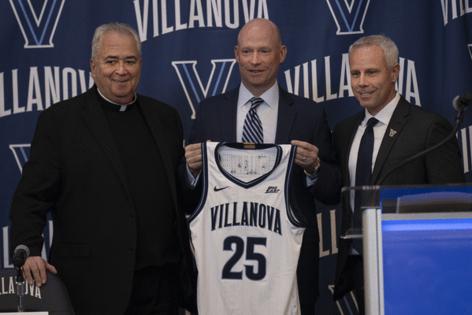Mike Sielski: Kevin Willard was honest about his task at Villanova. Villanova was honest about the pressure on him.
Published in Basketball
PHILADELPHIA — Villanova’s pep band, stationed in the lobby of the Finneran Pavilion, blasted out one fire-you-up song after another late Wednesday morning. And all the interested parties — the alumni and boosters and media and staff members, some of them newly hired within the last week — mingled in the arena’s lower level. And Kevin Willard entered for his formal introduction as the Wildcats’ men’s basketball coach, sat down for a spell before rising to speak, and then had the good sense to make a joke at his own expense.
“I’m going to be brief,” he said, “because I’ve learned over the last two weeks that it’s probably better to say less than it is more.”
Yep, the month of March had been a wild ride for Willard, so much good stuff, so much criticism, so much stress that was his own making. While he was guiding Maryland to the Sweet 16 and weighing his options for his future — stay at College Park, replace Kyle Neptune at ‘Nova — he’d have been better off either speaking his mind fully or just shutting up. Instead he did neither. Instead he said both too much and not enough and inspired most of the Terrapins’ fan base to regard him as a Judas. Was he going? Was he staying? Was he lobbying for better resources from Maryland? In a college hoops world where facing and acknowledging reality has never been more important or welcome, where everyone is learning to be up front about chasing a better job or another program — i.e. just more money — Willard’s equivocation was his biggest problem.
There was little of any such hemming and hawing Wednesday — not from Willard, not from Villanova athletic director Eric Roedl or president Rev. Peter Donohue, not from Jay Wright or Big East commissioner Val Ackerman or Friends of Nova president Randy Foye or anyone else banking that Willard is the coach to get the Wildcats back in the mix for Big East championships and NCAA Tournament berths. When he became Villanova’s president in 2006, Donohue said, having chaired the university’s theater department for 14 years, he had “no idea just how central a role athletics and basketball in particular would play in the work I do.” Now, nearly two decades later, even as he and Roedl were paying homage in their opening remarks to the university’s Augustinian tradition, Donohue was Waterford clear about Willard’s primary mission and its importance to the university.
“We have very high expectations for men’s basketball, and we should,” he said. “No pressure, but we expect great things in the season to come.”
Smart for Willard to keep his remarks short, then. His brevity gave him more time to get back to recruiting, to building a team for the 2025-26 season. Five scholarship players: That’s all Villanova has on its roster right now, and those 120 Zoom calls that Willard was on over the previous seven days were just a taste of the work he has yet to do. There are egos to be stroked and athletes to be coaxed and so many checks to be written.
“It’s out of control right now,” Willard said. “The average person just doesn’t understand what’s going on with the transfer portal, NIL, how much money is being spent, how much money is moving around.”
A coach in this environment will have to move with it. Wright had found a formula, maybe the formula, that transformed Villanova from an excellent program to arguably the best one in the country. He sought a certain sort of recruit, one who with the right coaching and development could be a terrific pro, one who was willing to stay on campus for a couple of years for the sake of that growth. Willard doesn’t have that kind of time. Few coaches, if any, do or will in this new era. So he brought over all his assistants from Maryland, kept just one of Neptune’s staff members, Ashley Howard, and pointed out that every program will have to be chameleonic from now on. No one can stick to one style of play, because no one knows what his team will look like from one year to the next.
“Jay’s system was phenomenal,” Willard said. “He could redshirt guys. I mean, you had guys like Mikal Bridges redshirting. Those days have blown away, and you’ll never see them again. So the playing style has to change. The way you teach the game has to change. That’s why I kept my whole staff. I have to teach my defense, my offense, and literally you have three weeks once you get your players to start working on it. You have to be so much more adaptive in the way you play. You can’t just say, ‘This is what we do. This is how we’re going to do it.’ It doesn’t work that way anymore. We will adapt to our roster and who we have on our roster.
“Where the flexibility comes in is your playing style. You’re not going to be able to always play fast or play big or play small. Your roster changes so much, but your culture doesn’t have to change. We have values we’re going to live by every day. That’s not going to change.”
Everything else will. Everything else already has. Nothing Willard said last month, all those verbal pretzels into which he twisted himself, mattered to Villanova’s leaders. They wanted him. They got him. This is what their basketball program is about. This is all college basketball is. Now he needs to win … next season. No pressure? Please. For Kevin Willard, there’s nothing but.
____
©2025 The Philadelphia Inquirer. Visit inquirer.com. Distributed by Tribune Content Agency, LLC.







Comments